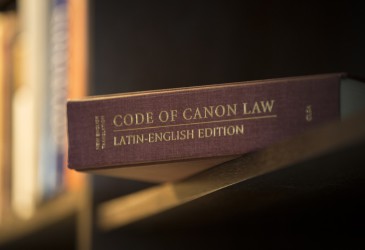
When your parents registered your birth with the Parish Council a live birth record was created recording only the Christian names. This is the title in the jurisdiction of Ecclesiastical. Not to be confused with a Birth Certificate which births a Legal Title, which is a title derived from the former and shifts your Person into the jurisdiction which Government controls, the Civil State. The live birth record is the property of your parents until the age of 21 when it becomes your own property. But you must claim this to operate with it. Wizardry has taken place in which your live birth record became a ward of the Civil State until you claim it. As you have not, you continue to act as the Debtor to Rome instead of as Creditor. The live birth record is the title outside the jurisdiction of the State of your nation, which requires a Surname as the Surety, in claiming your live birth record you shift under the jurisdiction of the State of Rome and it's canon law.
"Of course the highest common law is unwritten, because as a man, one is the image of God." If you want to invoke this jurisdiction, the highest form of autonomy, then you have much to learn about behaviour, honour and strength of character, you need to understand what it means to be a Man in Biblical terms.
England
Backdrop and Foundation to Western Nationhood, or the
Concept - Canon Law
http://www.vatican.va/archive/cod-iuris-canonici/cic_index_en.html
Canon 3228
The Twelve Presumptions of Court
A Roman Court does not operate according to any true rule of law, but by presumptions of the law.Therefore, if presumptions presented by the private Bar Guild are not rebutted they become fact and are therefore said to stand true [Or as truth in commerce]. There are twelve (12) key presumptions asserted by the private Bar Guilds which if unchallenged stand true being Public Record, Public Service, Public Oath, Immunity, Summons, Custody, Court of Guardians, Court of Trustees, Government as Executor/Beneficiary, Executor De Son Tort, Incompetence, and Guilt
How the Gospels have been Superseded
Gilbert Law Summaries
Canonum De Ius Positivum
Legal Definitions Of Interest
The Dark Side Of Common Law
Observance Of Due Process Of Law 1368
The Rules Of The Game For Judicial Office, Judges And Magistrates
Remedy From The Private, Certificate Of Participation
Common Law Trusts
The Law : Frederic Bastiat
In Profile : Definition Monarchy
Know Court Jurisdiction
Apostolic Letter Issued Moto Proprio
Chicago Manuel of Styles 16th Edition page - 575 American Sign Language
Chicago Manuel of Styles 16th Edition page - 576 Glosses in ASL
Chicago Manuel of Styles 16th Edition page - 819 Glossa
Chicago Manual of Styles 16th Edition full book as PDF
“An error which is not resisted is approved; a truth which is not defended is suppressed…. He who does not oppose an evident crime is open to the suspicion of secret complicity.”
Pope Felix III (as quoted by Pope Leo XIII in Inimica Vis.
Immigration is a means to keep up the fraudulent Legal Title derived from the Birth Certificate, to usurp the Credit Account evidenced in the Live Birth Record. The former invests your first name with a SURNAME A shift from Land and the Canon (Original Vatican law) to the offshore and Sea, Admiralty and Maritime jurisdiction for those lost at sea, the Holy See governs both the live and the dead.
Title determines jurisdiction on Person.
Encroachment and Trespass
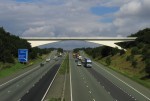 English Right to the Highway : The Molmutine Laws.
English Right to the Highway : The Molmutine Laws.
Origin of British law has links to the Trojans and the House of Judah and pre-dates the Saxon intrusion. King Molmutius and the right to the highway and the Iolo Morganwg's triads
 1215 : Magna Carta
1215 : Magna Carta
What is the Magna Carta? The Magna Carta is a document that King John of England (1166 1216) was forced into signing. King John was forced into signing the charter because it greatly reduced the power he held as the King of England
 1258 : Provisions of Oxford and Westminster
1258 : Provisions of Oxford and Westminster
A plan of reform accepted by Henry III, in return of promise of financial aid from his barons. England's first written constitution.Henry, bankrupted by a suspect venture in Sicily, summoned Parliament in the spring of 1258 (the Easter Parliament, or the so-called Mad Parliament). In return for a badly needed grant of revenue, Henry grudgingly agreed to abide by a program of reform to be formulated by a 24-man royal commission, half of whom were to be chosen by the king, half by the baronial party. The report of the commission (issued c. June 10) is known as the Provisions of Oxford.
 1689 : The Coronation Oath Act
1689 : The Coronation Oath Act
The Coronation Oath Act 1689 was created in order the nation felt secure that both William and Mary would swear to uphold the Protestant nation that was Great Britain, in 1701 and again in 1910, made it a statutory requirement on the monarch to take the Coronation Oath. Since 1936 the Realm of Great Britain has had no monarch because of two acts of treason from which all other unlawful acts have followed.
 1689 : English Bill Of Rights
1689 : English Bill Of Rights
In the Glorious Revolution of 1688, a group of English Parliamentarians invited the Dutch stadtholder William III of Orange-Nassau (William of Orange) to overthrow King James II of England (James VII of Scotland and James II of Ireland). William's successful invasion with a Dutch fleet and army led to James fleeing to France.
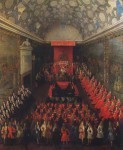 1707 : Act of Union
1707 : Act of Union
That the two Kingdoms of Scotland and England shall upon the first day of May next ensuing the date hereof, and for ever after, be united into One Kingdom by the Name of Great Britain. This must not be confused with the United Kingdom Corporation Sole; which todays acts as a mimic of the true nature of the realm that is England. The former are nations the latter is a corporation that binds you as a serf through your Trust. [Must be repealed.]
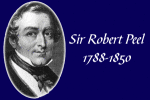 1829 : 9 Principles Of Law Enforcement Adopted By English And Commonwealth Constabularies
1829 : 9 Principles Of Law Enforcement Adopted By English And Commonwealth Constabularies
Principle 7 : To maintain at all times a relationship which gives reality to the historic tradition that the police are the public and that the public are the police; the police being only members of the public who are paid to give full time attention to duties which are incumbent on every citizen, in the interests of community welfare and existence.
The Oath of a English Police Constable
 What is going wrong with the Constabularies of England? We have a serious problem with Police officers, usually the younger generation, who take the attitude of an overbearing power crazed fruitcake, insist you listen to their sometimes childish garbage as they try to conjure a none existent law to harass you, and in the most extreme cases use threats of violence, agitating the public which sometimes leads to extreme violence against the citizen by multiple constables. We must recognise that the younger constables have been trained to the attitude so prolific amongst the ranks, we must also consider the fact each shift all constables are briefed on what duties they are to carry out and reminded of the attitude they must keep with the public. That said we must then consider the cause of this shift in attitude by public servants as coming from the top down.
What is going wrong with the Constabularies of England? We have a serious problem with Police officers, usually the younger generation, who take the attitude of an overbearing power crazed fruitcake, insist you listen to their sometimes childish garbage as they try to conjure a none existent law to harass you, and in the most extreme cases use threats of violence, agitating the public which sometimes leads to extreme violence against the citizen by multiple constables. We must recognise that the younger constables have been trained to the attitude so prolific amongst the ranks, we must also consider the fact each shift all constables are briefed on what duties they are to carry out and reminded of the attitude they must keep with the public. That said we must then consider the cause of this shift in attitude by public servants as coming from the top down.
Allodial Title : True Land and Property Ownership
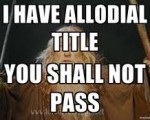 In property law, allodial title is a concept describing a situation wherein in land, buildings, fixtures or any other real property is owned for the cost of nothing and free from any financial burdens including tax, mortgage and liens. A property with an allodial title is inalienable, it is an absolute property of its owner and is not subject to any law and authority. This means that it cannot be taken for any reason whatsoever by any operation of law. Property owned under true allodial title is very rare to find.
In property law, allodial title is a concept describing a situation wherein in land, buildings, fixtures or any other real property is owned for the cost of nothing and free from any financial burdens including tax, mortgage and liens. A property with an allodial title is inalienable, it is an absolute property of its owner and is not subject to any law and authority. This means that it cannot be taken for any reason whatsoever by any operation of law. Property owned under true allodial title is very rare to find.
Insight Chronological Events
400 BC : King Molmutius institutes the Molmutine Laws
1215 : Magna Carta
1258 : Provisions of Oxford
1259 : Provisions of Westminster
1536-42 : Union with Wales
1567 : Crowned James VI of Scotland and King of England and Ireland as James I (claimed divine right to prevent Rome recovering Britain by divine right)
1626 : Charles I Dismisses Parliament
1628 : Parliament formed a Committee of Grievance and presented a Petition of Right to prevent taxation without the consent of Parliament
1629 : Parliament passes the Three Resolutions :
They would condemn any move to change the established religion
They would condemn taxation levied without the authority of Parliament
They declared that Merchants paying Illegal taxes betrayed the Liberty of England
1640 : Oliver Cromwell elected to Parliament for the second time
1642 : Outbreak of the Civil War (Bankers want London)
1646 : Charles I surrenders
1649 : The Rump Parliament gave itself the right to make Laws without the Kings approval
1649 : Charles I executed (The laws on Usury can now be obscured, the bankers have London)
1649 : Parliament abolishes the monarchy (The realm out of the hands of the monarch, in the hands of the illumined)
1649 : Cromwell chairs the New English Commonwealth
1653 : Oliver Cromwell elected Lord Protector of the Commonwealth
1658 : Oliver Cromwell dies and appoints his son, Richard, as his successor
1659 : Richard Cromwell resigns
1660 : The Restoration, General Monck marches to London, dissolves Parliament and Charles II is invited to resume the throne, but as a puppet monarch.
1685 : Charles II dies and is succeed by his brother James II
1689 : James II overthrown in the Glorious Revolution
1689 : William and Mary invited to become joint sovereigns, Coronation Oath Act 1689 created
1689 : Enactment of the Bill of Rights
1701 : The Act of Settlement made a statutory requirement on the monarch to take the coronation oath
1707 : Union with Scotland
1800 : Union with Ireland
1829 : 9 Principles Of Law Enforcement Adopted By British And Commonwealth Constabularies
1832 : (also 1867 and 1872) Reform Acts- extended voting rights and established the Secret Ballot
1910 : the Accession Declaration Act confirmed the statutory requirement on the monarch to take the coronation oath
1911 : Parliament Act
1914 : World War I and the culling of English and German men
1918 : Reform Act ended property qualifications for men
1921 : Anglo-Irish Treaty signed removing 26 Counties of Irish Free State
1928 : With a shortage of men Reform Act gave equal voting rights to women
1933 : Britain declares bankruptcy signs off British people as collateral via the Trust to the fund-The Bank for International Settlements
1936 : Treason, Edward VII removed, George takes an unlawful and thus void Coronation Oath giving him the levers of power without the duty to uphold the Realm.
1945 : Introduction of the Social Security System to fix the Trusts to a private enterprise.
1948 : Parliament Act
Now it gets very interesting indeed
Constitutional Realm of England
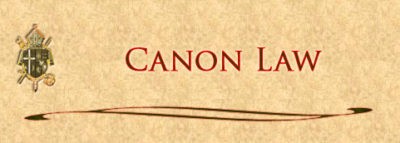
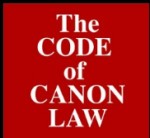

9 Comments on “”
Comments are closed.